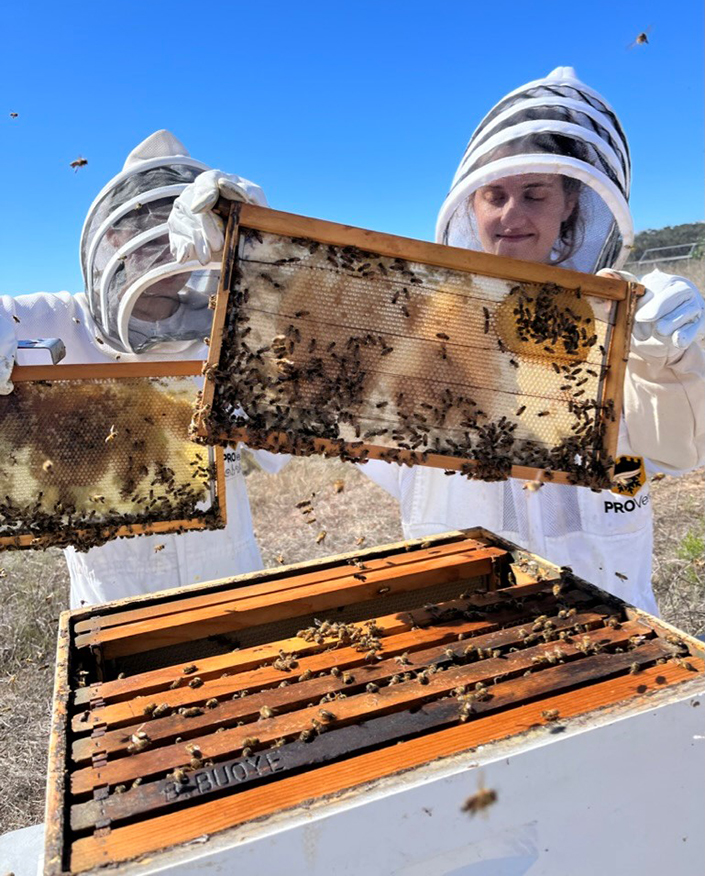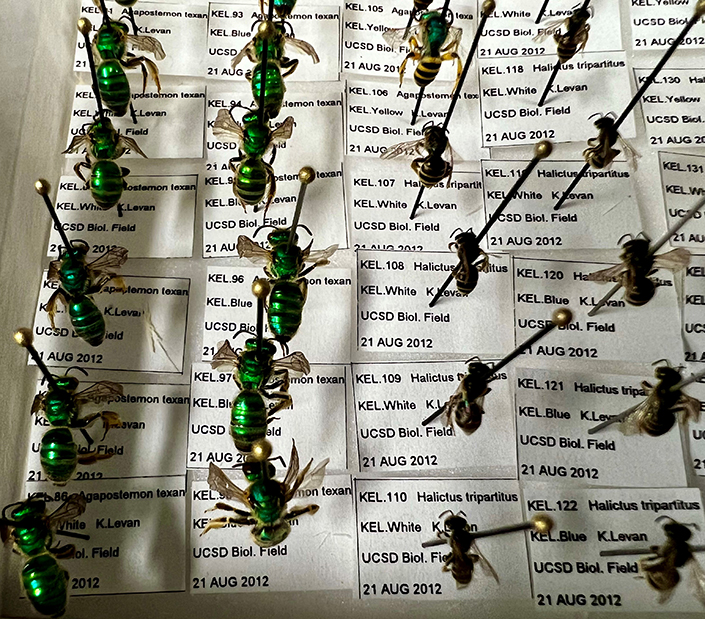UC San Diego Is Now a Bee Campus. Here’s What that Means…
Biologist offers insights on new national designation that supports pollinators and plants
Story by:
Published Date
Article Content
San Diego County is regarded as a global biodiversity hotspot with more than 600 species of native bees, numerous other pollinating insects and more plant species than any other county in the United States. UC San Diego recently became a Bee Campus USA member, part of a national program created to support pollinating organisms, boost the abundance of native plant species and reduce pesticide use. James Nieh, a bee expert and professor in UC San Diego’s Department of Ecology, Behavior and Evolution, has been working to support the new designation.
What does a Bee Campus USA designation mean?
The goal of the Bee Campus USA program, along with the Bee City USA initiative that the City of San Diego is working on, is to support all types of pollinators, including birds, bats, bees—and multiple insect pollinators including butterflies and moths—by preserving our regional biodiversity and increasing ecosystem resilience. The program was created by a prominent national group, the Xerces Society, which focuses on invertebrate conservation, and rests on several pillars.

First, there is an emphasis on education and outreach. San Diego, with its numerous educational institutions, including UC San Diego, can be a hub for educating our community about the importance of pollinators for ecosystem health. Bee campuses, with support from students, faculty, administrators and staff, pledge to conserve native pollinators through educational programs, by increasing habitats for native plants and by using an Integrated Pest Management (IPM) plan.
What makes the San Diego region uniquely suited for this designation?
UC San Diego and the City of San Diego are well-suited for Bee Campus USA and Bee City USA designations for several reasons, each amplifying the region’s unique position as a biodiversity hotspot. Firstly, the region is home to an extraordinary array of native bees, with over 600 species documented. This rich diversity extends to other pollinators and plants, making San Diego one of the most biodiverse counties in the United States. UC San Diego is also dedicated to enhancing biodiversity and sustainability. The Bee Campus designation is a natural fit and catalyst for ongoing campus efforts. The blend of rich local biodiversity, the campus focus on environmental stewardship and a large and engaged student population will make the Bee Campus USA program a great fit for our campus.
Why are these designations important for bee populations and the future of their habitats?
UC San Diego and the City of San Diego could leverage their considerable resources to educate and support biodiversity. They can help safeguard pollinators and their habitats since the loss of habitat is one of the most pressing threats to our natural biodiversity. Thus, initiatives that focus on habitat restoration and increase the number of native plants can contribute significantly to pollinator survival. Secondly, educational outreach has a key role in helping communities understand the essential role that bees and other pollinators play in ecosystem functioning and food production.
Bee Campus and Bee City USA designations encourage the reduction of pesticide use through the development and implementation of an IPM. A decade ago, UC San Diego established its IPM program, successfully cutting pesticide usage by approximately 70-80%. The IPM initiative prioritizes identifying and exploring alternatives for insecticides that are detrimental, striving to employ non-chemical methods whenever feasible. Balancing the need for pest control in open spaces with the conservation of pollinators is a challenge that will require ongoing research, collaboration and adaptive management strategies for the health and safety of our open spaces.
How do bees and other pollinators factor into agricultural and economic benefits for the region?


Bees and other pollinators are integral to San Diego County’s agricultural and economic landscape, underpinning key sectors that are vital for the region’s prosperity. In agriculture, San Diego ranks as the number one producer of avocados and holds the second position in the cultivation of guava, pomegranate, limes and macadamia, generating $153 million in annual revenue. These high-value crops are heavily dependent on pollination services. Without effective pollination, yields would decline dramatically, affecting not only farmers but also multiple downstream industries.
The significance of pollinators extends to the tourism sector, particularly ecotourism, which is another economic powerhouse for the region. Tourism in San Diego employs over 200,000 individuals, generates visitor spending in excess of $14.2 billion annually and more than $400 million in hotel taxes. The natural beauty that forms the cornerstone of the region’s tourism appeal is, in part, maintained by the ecological services provided by pollinators. They play a crucial role in sustaining the biodiversity of outdoor spaces that tourists flock to, thereby indirectly contributing to the industry’s success.
How do the Bee Campus USA and Bee City USA programs raise awareness about the concerns caused by pesticides?
The programs employ a multi-pronged approach that includes educational outreach and hosting at least one pollinator awareness event each year. These events often include discussions, workshops and informational materials that highlight the negative impacts of pesticides on bees and other pollinators. They serve to educate the general public, policymakers and stakeholders about sustainable pest management practices that are less harmful to pollinators.
UC San Diego is currently working on building its Bee Campus website, which will create an active online presence where we can share information to our community.
The program’s requirements, therefore, act as a catalyst for communities and individuals to scrutinize and revise their pesticide usage policies. In doing so, Bee Campus USA and Bee City USA serve as an effective platform for raising awareness about pollinators.
How does the UC San Diego's Bee City USA initiative work?
The steering committee for UC San Diego Bee Campus USA is the UC San Diego Pollinator Protection Steering Committee and consists of campus leadership (Patty Mahaffey, Assistant Vice Chancellor of Student Life), campus staff (Todd Schmidt and Chris Johnson) and diverse faculty from the School of Biological Sciences with expertise on pollinators and conservation (James Nieh and Michael Perry), faculty from Urban Studies and Planning (Amy Lerner and Juli Hinds) and PhD and undergraduate students. The committee provides recommendations for the campus and helps to plan Bee Campus events, supports our diverse campus student gardens and coordinates the different Bee Campus educational programs.
Share This:
Stay in the Know
Keep up with all the latest from UC San Diego. Subscribe to the newsletter today.




